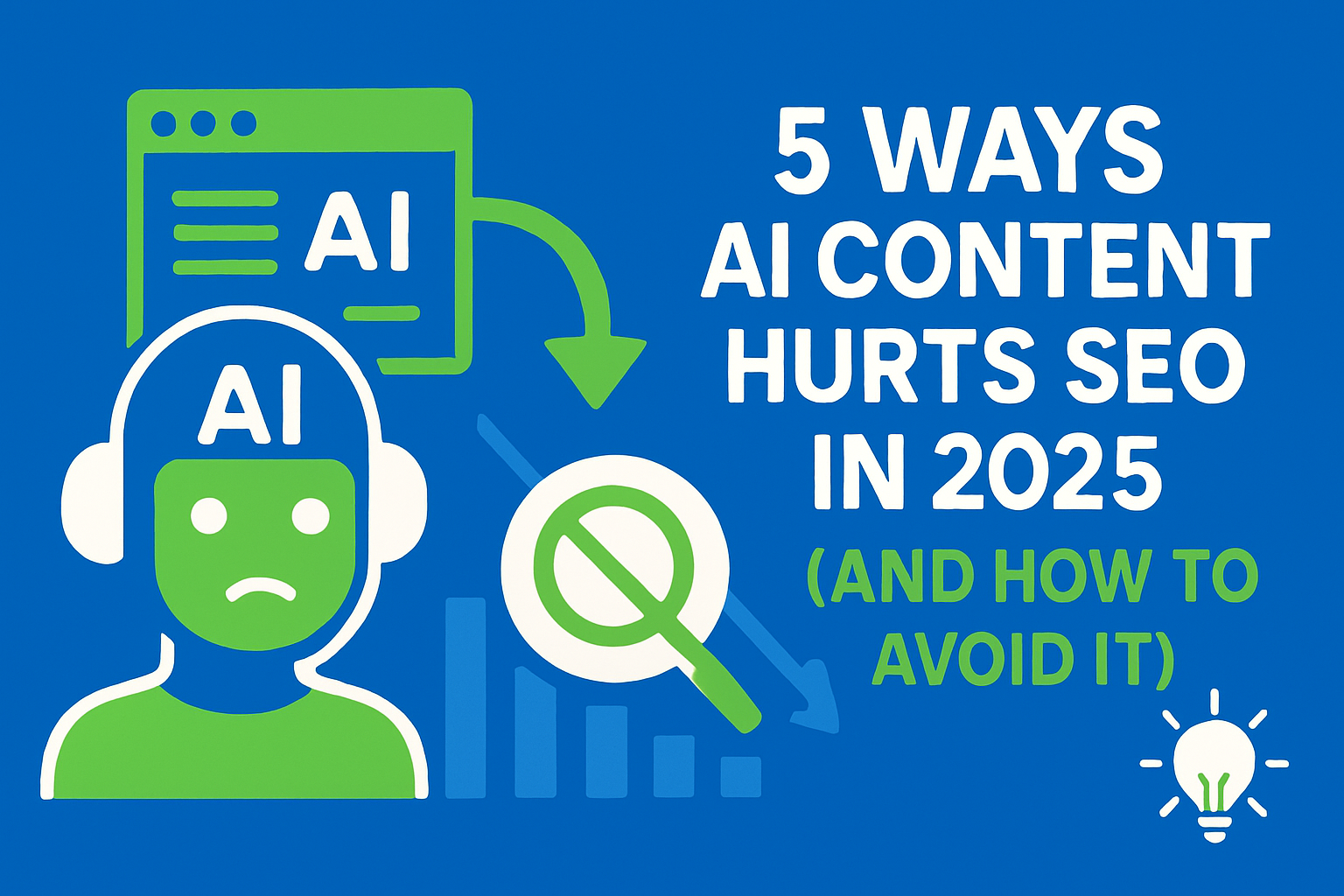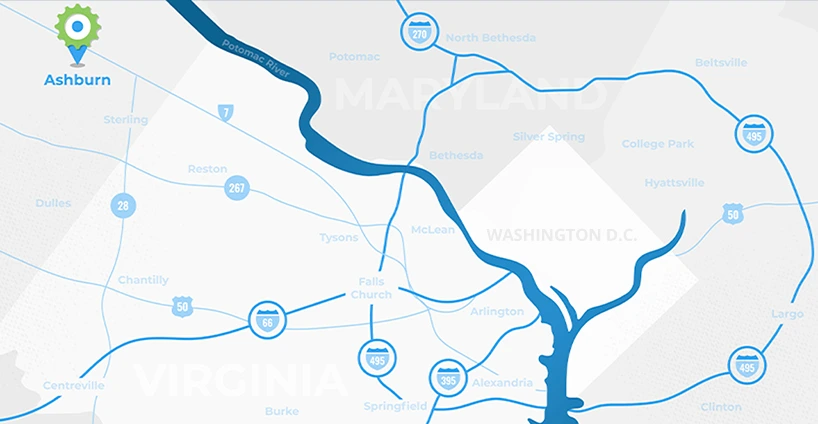5 Ways AI Content Hurts SEO in 2025 (and How to Avoid It)

If you're wondering "does AI hurt SEO?"—the answer isn't simple. In 2025, Google doesn’t penalize content just because it's made with AI. Instead, it prioritizes quality, relevance, and intent behind every piece. Used wrong, AI content can cause weak rankings, trust issues, or even brand damage, but there are proven ways to sidestep these risks.
ImageWorks Creative has delivered smart SEO and web strategies since 1997, blending new tools with real marketing expertise. To help your business grow the right way, focus on these solutions: pair AI with human editing, stay focused on user needs, and always review your site for quality. Need AI content help? Start with these trusted sites:
- Fiverr (freelancer marketplace)
- Upwork (professional talent)
- LinkedIn (top-tier content experts)
If you want to avoid the pitfalls of generic AI content and keep your site strong in search, explore our approach to balancing AI and human expertise. Or, see how unchecked AI content can damage your brand if left on autopilot. Want help? Book a call with ImageWorks Creative to start building smarter digital marketing for your DC business.
How AI Content Can Damage SEO in 2025
Does AI content hurt SEO in 2025? The reality: Yes—if it’s thin, inaccurate, or triggers spam signals, your rankings and brand trust are at risk. Even as AI tools become more advanced, over-reliance can backfire. Google cares about value, accuracy, and user intent, not just how quickly you can fill a page with words. Here’s what every DC small business should watch out for, plus better solutions to boost your SEO without losing your edge.
Thin, Generic, or Repetitive AI Content
When you let AI tools crank out large volumes of content with little oversight, you often end up with generic articles that barely touch the surface. These pages tend to:
- Lack original insights or authentic stories
- Use the same phrases and structure as other sites
- Skip the unique examples or local expertise that Google (and real readers) value
Why is this a problem? Google’s search guidelines stress the importance of unique, people-first content. When AI regurgitates existing knowledge with no human touch, your website blends into the crowd. Users bounce quickly, and search engines drop your rankings. Even worse, there’s real risk that your site will show up with nearly identical content as your competitors—making you invisible online or, in some cases, facing duplicate content issues.
To avoid these traps, always add your brand’s voice, local context, and clear value. Not sure where to start? Pairing AI with expert human edits and custom blogging strategies can give you both efficiency and originality.
Fact-Checking and AI Errors
One of the biggest problems with AI-generated content is unreliable information. AI tools pull from existing data on the internet, but they often get facts wrong or out of date. This can result in:
- Misinformation (wrong stats or claims presented as facts)
- Outdated advice (old best practices that no longer apply)
- Made-up sources or data ("AI hallucinations")
Small businesses can’t afford to risk their reputation on shaky facts. Readers lose trust fast if they spot errors, and so does Google’s algorithm. Sites caught spreading false information (even by accident) can be hit with lower rankings—or in rare cases, legal trouble for false advertising.
The solution? Treat every AI draft as a rough starting point. Build in a workflow that includes manual fact-checking, cross-referencing with trusted sources, and infusing your professional perspective. Experts recommend a blend of AI and human review for all content creation for marketing. Double-check everything before you hit publish.
For a deeper look at the risks and statistics on this trend, check out this authoritative guide on how AI-generated content can hurt your SEO.
Over-Optimization and Spam Signals
AI content generators tend to overdo keywords, especially if you prompt them to "optimize for SEO." The end result? Pages stuffed with repetitive keywords, awkward phrasing, or unnatural sentences that simply don’t sound human. These are major red flags for Google’s spam filters, leading to:
- Lower rankings, or even search penalties
- Users bouncing from your pages due to clunky language
- A negative brand reputation that’s hard to undo
Over-optimized pages aren’t just unhelpful—they make your site look untrustworthy. Search engines have evolved to spot these tricks instantly, especially in high-competition industries like law, healthcare, and local services. As reported in research on AI SEO risks for 2025, penalties for spammy AI content can be swift and severe.
Protect your business by using organic SEO services that blend AI-powered outlines with expert refinements. Real experts know how to keep your site compliant, readable, and trusted.
By staying alert for these AI content weaknesses, you can create pages that stand out for the right reasons. With a smart mix of tools and human expertise, your website won’t just avoid trouble—it’ll rise in the rankings and earn user trust.
Practical Ways to Avoid AI Content SEO Pitfalls
To answer the big question—does AI hurt SEO—the clear takeaway is: only if you let it run unchecked. AI-generated content alone often falls short, but smart processes can tip the balance in your favor. Since 1997, ImageWorks Creative has blended tech and human insight to build smarter content that stands out and stays compliant with search trends. If you’re looking to elevate your SEO while avoiding those AI stumbles, here are hands-on strategies every DC small business should try.
Quick resource roundup:
- Fiverr – Tap into a wide pool of skilled editors for fast, affordable reviews.
- Upwork – Hire vetted SEO writers, fact-checkers, and web pros on demand.
- LinkedIn – Connect with digital marketing experts who understand the local business scene.
Enrich AI Content with Human Editing and Experience
AI is fast, but speed alone can’t outshine real experience. When you take those AI drafts and edit with expertise, your content reflects the trustworthiness that Google rewards.
- Personal stories bring color and honesty. For example, share customer successes or behind-the-scenes moments that only your business can tell.
- Expert commentary adds authority. Weave in your professional opinions, lessons learned, or strategies that are unique to your field.
- Hands-on editing polishes flow and style. Tighten up sentences, clarify points, and break free from robotic patterns with your own voice.
Not only does this approach keep your content original, it also helps you form a stronger connection with your readers. Google and your customers both notice when your pages sound real—not recycled.
If you’re ready to blend AI efficiency with true expertise, check out our B2B SEO Plans for strategies that go beyond generic copy. Or, if you serve local markets, explore our Local SEO Service Plans to amplify your unique brand voice in your community.
Rigorous Fact-Checking and Validation Processes
Does AI content hurt SEO? Inaccurate information will always put your reputation at risk—even in 2025. Fact-checking is your first line of defense.
Follow this proven process to boost accuracy:
- Cross-check every fact: Compare claims or stats from AI drafts against credible sources.
- Use trusted tools:
- Google Fact Check Explorer – Find reliable confirmations for news, stats, and data.
- Grammarly’s Plagiarism Checker – Ensure your draft doesn’t accidentally repeat another site’s content.
- SEMrush or Ahrefs – See if your content matches key search intent and is up to date.
- Refresh outdated info: AI may use older data, so always verify that advice, technology, or trends are current.
- Meet Google’s E-E-A-T guidelines: Focus on Experience, Expertise, Authoritativeness, and Trustworthiness. Human review ensures you catch subtle errors AI may miss.
Want practical tips to keep your business listings and web info current? See our full guide on Tips to Rank Higher on Google Maps 2025 for actionable strategies.
Transparency and Ethical AI Use
Your readers care about honesty—and so does Google. Using AI tools isn’t a secret, but pretending otherwise can erode trust.
- Disclose AI participation when applicable. Add a simple note if a post was co-created with AI, especially for long-form guides.
- Credit human editors and mention your review process.
- Attribute unique insights to your team or client stories, distinguishing your expertise from generic AI suggestions.
- Adopt clear ethical standards: Follow industry best practices for transparency, attribution, and algorithmic content review. Stay informed with sources like the Ethics Guidelines for Trustworthy AI published by the European Commission.
Not sure how to balance AI and human effort for optimal SEO? Check out our in-depth look at why AI-empowered web design works best when guided by human expertise.
By pairing these three strategies—thoughtful editing, thorough fact-checking, and open disclosure—you can sidestep the most common ways AI content hurts SEO and put your brand’s best foot forward.
Best Resources for Safe, High-Quality AI Content Creation
If you're worried about “does AI hurt SEO” and want reliable ways to create safe, high-quality content, you're not alone. Since 1997, ImageWorks Creative has helped DC-area businesses get better results by picking the right mix of tools and real human talent. The winning formula to avoid generic or risky AI content is simple: combine industry-trusted editing resources with platforms focused specifically on quality and security.
Here's a quick list of the top three sites every small business should know for sourcing high-quality, safe AI content support:
- Fiverr: Tap into a wide pool of freelance editors and reviewers to double-check AI drafts and boost originality.
- Upwork: Connect with experienced SEO writers, proofreaders, and creative experts for ongoing content partnerships.
- LinkedIn: Discover professionals with proven track records in AI-assisted content and digital marketing.
Avoiding the biggest pitfalls of AI content—like duplication or errors—starts with smart resource choices. Below, you’ll find tools and platforms that help you generate better ideas, stay accurate, and keep your strategy safe.
Leading Platforms for AI Content Creation
These tools ensure your AI-generated text stands out for the right reasons. They focus on safety, accuracy, and quality, vital for anyone asking, "does AI content hurt SEO."
- Synthesia: Not just for writing—this popular platform transforms text into video, perfect for diversifying your content strategy and increasing visitor engagement.
- Blend: Blend reviews the best AI tools for content creators, helping you compare quality and safety features side-by-side.
- Zapier: Zapier’s guide spotlights tools that integrate seamlessly with your workflow—letting you vet your AI drafts faster and more securely.
All these choices make it easier to build professional, credible content without giving up control. For more ways to mix automation and authentic storytelling, review our guide on AI-powered web design and human-driven results.
Best Practices for Safe AI Content Generation
Getting great results means using the right practices, not just picking strong tools. Here’s how to keep your content safe and polished every time:
- Start with keyword research using AI tools to brainstorm topics, but tweak them for local relevance and real customer pain points.
- Use AI for outlines only. Structure your articles with algorithmic help, and then fill in details with first-hand experience and expert case studies.
- Always fact-check before publishing. Use both built-in AI features and manual reviews with trusted freelance experts to avoid errors.
- Audit for originality with tools like Grammarly and run plagiarism checks, so you don’t risk duplicate content penalties.
Good content supports your credibility and grows your customer base. AI-powered ideas combined with DC-specific human insight will outmatch anything generic tools can spin out alone.
Finding Expert Help and Staying Compliant
Avoid the hassle of low-quality AI drafts by investing in real expertise. Platforms like Fiverr, Upwork, and LinkedIn can connect you with local professionals who understand the demands of the DC market. Experienced editors and marketers ensure compliance with Google’s guidelines and offer the “human touch” that keeps users coming back.
If you’re looking to reliably balance automation and safety, consider an internal approach: The ImageWorks team audits, edits, and enhances every AI draft for maximum originality and SEO value. For web design and digital marketing advice rooted in decades of proven results, check out our tips on balancing AI and human expertise.
Key Takeaways:
- Pair AI tools with expert freelancers or local agencies for the safest, highest-quality content.
- Focus on originality, fact-checking, and ethical use with every draft.
- Use trusted directories and platforms—like Fiverr, Upwork, and LinkedIn—to source dependable talent.
- Bookmark expert reviews of top AI tools to stay ahead of content trends.
Ready to create safe, original content and finally answer, “does AI content hurt SEO” with a resounding “not if you do it right”? Book a call with the ImageWorks Creative team for a clear, expert-driven plan tailored for your business’s growth.
Conclusion
Clear, original, and expert-guided content will always win—and that holds true for 2025. While AI brings speed and efficiency to SEO, it can hurt results fast if left unchecked. Key risks include generic writing, factual errors, over-optimization, and a lack of human touch—all affecting trust and visibility. The best fix? Pair AI technology with experienced editors, robust fact-checking, and smart strategy.
ImageWorks Creative has been leading DC and DMV businesses through digital shifts since 1997, blending expert insight with proven tools for results you can trust. If you're ready to beat the common “does AI hurt SEO” risks, our team offers a clear path: layer efficient AI with human creativity and compliance. For next steps, explore our insights on AI-powered web design guided by human expertise, or reach out to design your custom content plan.
Ready to future-proof your SEO? Book a call with ImageWorks Creative today and put decades of expertise to work for your growth.
Thank you for reading—share your thoughts or questions below and let’s keep the conversation going.







